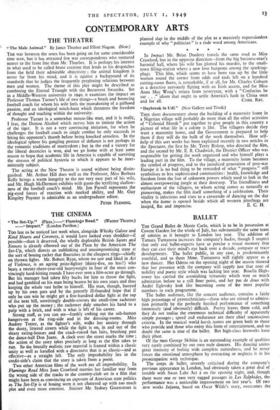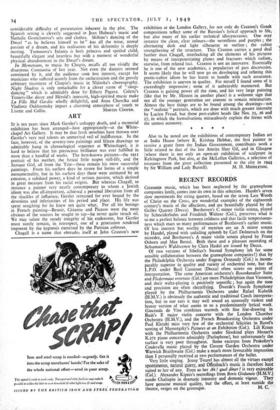BALLET
THE Grand Ballet de Monte Carlo, which is to be in possession at Covent Garden for the whole of July, has substantially the same team of soloists as it brought to London last year. The addition of Tamara Tumanova increases the company's kudos, though I suspect that only real ballet-experts have so precise a visual memory that they can cast their mind's eye back over a decade, compare or trace developments. The ballet public, in any case, is predominantly youthful, and to them Mme. Tumanova will rightly appear as a new dancer. Hcr Odette on the opening night of the season showed that her presence with the company will supply just that note of nobility and poetic style which was lacking last year. Rosetta High- tower has carried the astonishing virtuosity which won so much admiration before to a still finer point, and her pas de deux with Andre Eglevsky look like becoming some of the most popular numbers in each programme.
The ballet audience, like the concert audience, contains a fairly high percentage of pyrotechnicians—those who are stirred to admira- tion primarily by the perfectly finished performance of something immensely (and obviously) difficult. Poetry leaves them cold, and they do not realise the enormous technical difficulty of apparently simple passages ; speed and endurance are their chief unconscious criteria. In the musical world harsh names are given both to those who provide and those who enjoy this form of entertainment, and no doubt the same is true of the ballet. But high-class fireworks have their place.
Of the men George Skibine is an outstanding example of qualities very rarely combined by our own male dancers. His dancing unites great intensity of feeling with complete naturalness, and he never forces the emotional atmosphere by overacting or neglects it in his preoccupation with technique.
The corps de ballet, severely criticised during the company's previous appearance in London, had obviously taken a great deal of trouble with Swan Lake Act z on the opening night, and, though there were one or two very ragged passages in Les Sylphides, the performance was a noticeable improvement on last year's. Of two new works Infanta, based on Oscar Wilde's story, overcomes the considerable difficulty of presentation inherent in the plot. The Spanish setting is cleverly suggested in Jean Hubeau's music and Nathalic Gontcharova's sets and clothes. Skibine's dancing of the Dwarf "as he believes himself to be" has all the tense, unreal passion of a dream, and his realisation of his deformity is deeply moving. Tumanova's Infanta is both princess and spoiled child, beautifully elegant and heartless but with a moment of wonderful physical abandonment in the Dwarfs dream.
In Memoriam, to music by Chopin, recalls all too vividly the disastrous Constantia of last year. Not even the dancers seemed convinced by it, and the audience soon lost interest, except for musicians who suffered acutely from the orchestration and the grossly arbitrary treatment of Chopin's music in Nijinska's choreography. Night Shadow is only remarkable for a clever scene of " sleep- dancing " which is admirably done by Ethery Pagava. Coletti's Teniers-like decor and Herold's innocent, high-spirited music make La Fille Mal Gardie wholly delightful, and Anna Cheselka and Vladimir Oukhtomsky impart a charming atmosphere of youth to







































 Previous page
Previous page